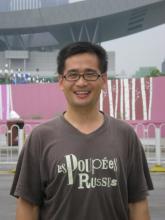Stress response and cellular ageing in yeast
 Calorie restriction without malnutrition has been shown to extend lifespan in all eukaryotic organisms. This lifespan extension is intimately related to enhanced stress resistance and metabolic reprogramming. Using Saccharomyces cerevisiae as a model, we intend to understand how eukaryotic cells regulate starvation-induced stress response and metabolic reprogramming and how this regulation impacts on chronological lifespan.
Calorie restriction without malnutrition has been shown to extend lifespan in all eukaryotic organisms. This lifespan extension is intimately related to enhanced stress resistance and metabolic reprogramming. Using Saccharomyces cerevisiae as a model, we intend to understand how eukaryotic cells regulate starvation-induced stress response and metabolic reprogramming and how this regulation impacts on chronological lifespan.
Currently, two complementary approaches are adopted to address the issue. One is to reveal the genetic interaction network governing stress response and chronological ageing. The other is to elucidate the mechanisms by which the nutrient starvation signals are transmitted and converged to activate the stress response and the acquisition of other quiescence-related features, including exit from the cell cycle and cell size homeostasis. Furthermore, we are interested in how the antioxidant system and metabolic reprogramming interact to achieve adaptive response to nutrient limitation. The knowledge gained from these approaches is being applied to develop interventions to improve lifespan in higher organisms and to design novel fermentation systems for biotechnology.
Lab Members: Leonardo Mancini; Lu Cao, Fiona Tang, and Nyasha Munjoma
Collaborators: Jules Griffin (CSBC); Hui Lu (University of Manchester); Steve Oliver (CSBC); and Yanchun Yan (Chinese Academy of Agricultural Sciences).
Key recent publications:
- Zhang N# and Cao L (2017) Starvation signals in yeast are integrated to coordinate metabolic reprogramming and stress response to ensure longevity. Current Genetics. In press. DOI : 10.1007/s00294-017-0697-4
- Cao L, Tang Y, Quan Z, Zhang Z, Oliver SG and Zhang N# (2016) Chronological lifespan extension by calorie restriction in yeast depends on the accumulation of storage carbohydrates mediated by Yak1, Rim15 and Mck1 kinases. PLoS Genet. 12(12):e1006458. doi: 10.1371/journal.pgen.1006458.
- Zhenzhen Quan, Lu Cao, Yingzhi Tang, Yanchun Yan, Stephen G. Oliver and Nianshu Zhang#. (2015) The yeast GSK-3 homologue Mck1 is a key controller of quiescence entry and chronological lifespan. PLoS Genet. 11(6):e1005282. doi: 10.1371/journal.pgen.1005282.
- Zhang N#, Quan Z, Rash B, Oliver SG#. (2013) Synergistic effects of TOR and proteasome pathways on the yeast transcriptome and cell growth. Open Biol. 3(5):120137. doi: 10.1098/rsob.120137.

